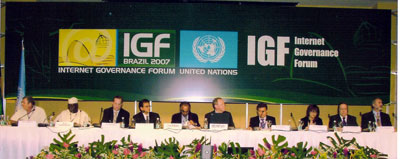|
The Diversity plenary session within the second Internet Governance Forum took place on 13 November 2007 in the Segovia Hall of the Winsor Barra Hotel, Rio de Janeiro.

The session was chaired by Gilberto Gil, Minister of Culture of Brazil, and moderated by Chris Disspain, Chief Executive Officer, .AU Registry, and Chair, Council of Country-Code Names Supporting Organization (ccNSO).
The panellists were:
- David Appasamy, Chief Communication Officer, Sify Ltd., Chennai, India
- Monthian Buntan, Executive Director, Thailand Association of the Blind, Bangkok
- David Dzumba, Nokia, USA
- Tatiana Ershova, General Director, IIS, Russia
- Adama Samassékou, Executive Secretary, African Academy of Languages
- Patrik Faltström, Consultant, Cisco Systems, Sweden
- Ben Petrazzini, Head, Institute for Connectivity in the Americas, Montevideo
- Daniel Pimienta, Director, Funredes, Santo Domingo
The discussants were:
- Maria Badia, Member, European Parliament
- Divina Frau-Meigs, Professor, Paris III, France
- Pierre Ouédraogo, Intergouvernementale de la Francophonie, Burkina Faso
- Caio Tulio Vieira Costa, President, iG, Brazil
The transcript of the session is available at http://www.intgovforum.org/Rio_Meeting/IGF2-Diversity-13NOV07.txt.
Tatiana Ershova's speech is quoted in full text below.
"Mr. Chairman, ladies and gentlemen, my dear colleagues,
I'd like to express my profound appreciation to the members of this forum to giving me the opportunity to discuss one of the most important issues for the global information society and for my country. Diversity and how to manage it is an issue for a Russian.
Russian Federation is a federal state comprising 85 subjects – equitable, but manifold in terms of administrative relationship. Russian territory is situated on 11 time zones and on ten geographical zones. Russian Federation is a multinational state with over 180 ethnic groups with unique cultures and traditions, and all live on its territory. Citizens of Russia speak more than 150 languages. Two dozen languages have an official status in the Russian Federation: Russian as a state language on the entire territory, and 23 more languages as state languages of the subjects of federation. Also, Russia is a multiconfessional state where all majors religions are represented and respected. All this is relevant in terms of Internet governance.
One could single out a number of dimensions related to diversity. But I would mention those considered by the WSIS outcome documents and the Synthesis Paper for the second IGF meeting. These are cultural diversity, diversity of choice, linguistic diversity, and diversity of media, and also stakeholder and organizational diversity, which seems to be of great importance for me, as for a representative of a civil society organization.
I cannot refrain from stressing how it is crucial to keep to the main clauses of the WSIS documents in our everyday efforts at any levels.
In the context of developing linguistic diversity and shaping multilingual environment, it is necessary to ensure the internationalization of the Internet. The importance of the internationalized domain names is discussed very widely now as essential for continued Internet development. As it is known, in October 2007, ICANN announced an evaluation of Internationalized Domain Names that will allow Internet users to test top-level domains in 11 languages, and accordingly, for 11 sets of characters. Russia participates in this trial. The Russian government advocates the implementation of a reductive administrative procedure which would allow in the most near future delegating the ccTLD with the use of national alphabets.
Many countries support construction of a multilateral, democratic, and transparent global Internet governance model. Our government comes out in favor of proposal to discuss practical steps towards the involvement of stakeholders, particularly from the developing countries, in the decision-making on Internet governance policy issues. It would be good if the Internet Governance Forum here in Rio recommends the U.N. Secretary-General to create a working group on the elaboration of practical steps and measures to ensure a gradual transition of the Internet governance system under the control of the international community.
Thank you very much for your attention."
|

